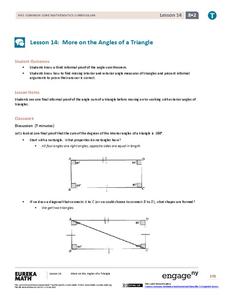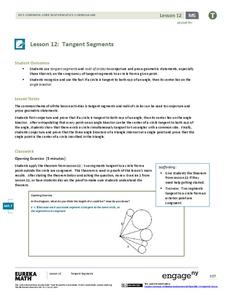Illustrative Mathematics
Placing a Fire Hydrant
Triangle centers and the segments that create them easily become an exercise in memorization, without the help of engaging applications like this lesson. Here the class investigates the measure of center that is equidistant to the three...
EngageNY
Mid-Module Assessment Task - Geometry (Module 2)
Challenge: create an assessment that features higher level thinking from beginning to end. A ready-made test assesses knowledge of dilations using performance tasks. Every question requires a developed written response.
EngageNY
End-of-Module Assessment Task - Geometry (module 2)
Increase the level of assessment rigor with the test of performance tasks. Topics include similar triangles, trigonometric ratios, Law of Sines, Law of Cosines, and trigonometric problem solving.
EngageNY
Criterion for Perpendicularity
The Pythagorean Theorem is a geometry pupil's best friend! Learners explain the equation a1b1 + a2b2 = 0 for perpendicular segments using the Pythagorean Theorem. They are able to identify perpendicular segments using their...
West Contra Costa Unified School District
Divisibility Rules Justified
How do you know if a number is divisible? Instructors first prove the divisibility rules for three and four and then class members use this modeling to prove given divisibility rules for eight and nine either individually or in...
EngageNY
More on the Angles of a Triangle
Angles and triangles: they're all connected. Uncover the connections between angles in triangles. Scholars learn how to find both exterior and interior angle measures in triangles. The lesson emphasizes the vocabulary related to these...
Cornell University
Nano What?
The size of a nanoparticle is difficult for pupils to grasp. A hands-on experiment is designed to give your classes perspective. Learners analyze different sports drinks for the content of electrolytes as an introduction to nanoscale....
Curated OER
What a Character!
Middle schoolers read a novel and discuss character personality. First, they analyze a character in a novel and keep a chart or web of the character's identity, which includes specific examples from the book. They then write a script...
Curated OER
Getting to Know Characters
This set of worksheets constitutes enough work and materials to be considered a lesson. They guide readers through a process of exploring characters and their motivations, and writing a paragraph about them. Here are seven handouts that...
Curated OER
Proofreading
Do your second graders like riddles? Give them a giggle and a lesson about proofreading at the same time. After reading two riddles, young writers fix punctuation and capitalization errors. They write the answer to each riddle at the...
Arizona Department of Education
Introduction to Integers
Welcome to the backward world of negative numbers. This introductory lesson teaches young mathematicians that negative numbers are simply the opposite of positive numbers as they use number lines to plot and compare...
Curated OER
Word Problem Practice Workbook
Need worksheets that challenge your middle schoolers to apply their understanding of math? Problem solved! From integers, fractions, and percents, to algebra, geometry, and probability, over 100 pages of word problem worksheets...
EngageNY
Solve for Unknown Angles—Angles in a Triangle
Assist your class with each angle of geometry as they use exterior angles to form linear pairs with adjacent interior angles. They cover multiple vocabulary terms and work practice problems, complete with justifications, before...
EngageNY
Inscribed Angle Theorem and Its Applications
Inscribed angles are central to the lesson. Young mathematicians build upon concepts learned in the previous lesson and formalize the Inscribed Angle Theorem relating inscribed and central angles. The lesson then guides learners to prove...
EngageNY
Tangent Segments
What's so special about tangents? Learners first explore how if a circle is tangent to both rays of an angle, then its center is on the angle bisector. They then complete a set of exercises designed to explore further properties and...
University of Utah
Geometry: Angles, Triangles, and Distance
The Pythagorean Theorem is a staple of middle school geometry. Scholars first investigate angle relationships, both in triangles and in parallel lines with a transversal, before proving and applying the Pythagorean Theorem.
EngageNY
Obstacles Resolved—A Surprising Result
The greater the degree, the more solutions to find! Individuals find the real solutions from a graph and use the Fundamental Theorem of Algebra to find the remaining factors.
West Contra Costa Unified School District
Pythagorean Theorem and Its Converse
Challenge scholars to prove the Pythagorean Theorem geometrically by using a cut-and-paste activity. They then must solve for the missing sides of right triangles.
Bowland
Magic Sum Puzzle
Learners discover the magic in mathematics as they solve numerical puzzles involving magic sums. They then make a conjecture as to why no additional examples are possible based on an analysis of the puzzles.
Radford University
Parallel Lines, Transversals, and Angles: What’s the Connection?
Streets, bridges, and intersections, oh my! Parallel lines and transversals are a present in the world around us. Learners begin by discovering the relationship of the angles formed by parallel lines and a transversal. They then...
EngageNY
Mid-Module Assessment Task - Geometry (Module 1)
How do you prepare class members for the analytical thinking they will need in the real world? An assessment requires the higher order thinking they need to be successful. The module focuses on the concept of rigid transformations...
EngageNY
Applications of the Pythagorean Theorem
Examine the application of the Pythagorean Theorem in problem-solving questions. Pupils apply the theorem to find lengths when given different scenarios. They finish the 17th installment in an 18-part series by applying the theorem...
Virginia Department of Education
Inductive and Deductive Reasoning
Introduce pupils to the two types of reasoning, inductive and deductive. Classmates work in pairs or small groups to learn the difference between the two and apply these reasonings to develop valid conclusions.
Virginia Department of Education
Similar Triangles
Pupils work in pairs to investigate what it takes to prove that two triangles are similar. They work through various shortcuts to find which are enough to show a similarity relationship between the triangles. Small groups work with the...
Other popular searches
- Geometry Proofs
- Geometry Proofs Worksheets
- Geometric Proofs
- Indirect Proofs
- Coordinate Geometry Proofs
- Circle Proofs
- Congruent Proofs
- Triangle Proofs
- Basic Geometry Proofs
- Theorems and Proofs
- Flow Proofs
- Lesson on Geometry Proofs

























